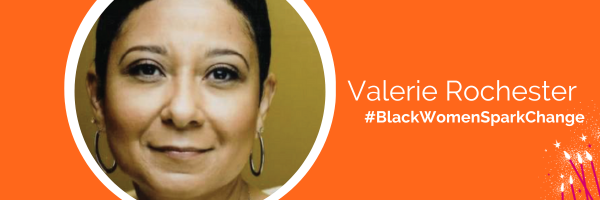
AIDS United’s VP shares her personal journey from a decades-long career in public health
Indiana native Valerie L. Rochester has always been committed to service. “I actually had a very circuitous route to get to where I am today,” she says. “I had no idea I’d wind up in the nonprofit world because that was never my intention.” Now, as Vice President for Program Strategy at Washington, DC-based AIDS United, she’s bringing her passion and commitment to drive massive, meaningful change.
“Early in my career, I wanted to be the Black Barbara Walters. My undergraduate degree is in mass communication—I got an entry-level job in broadcast journalism right away.” Even so, she found limited opportunities from there. After a few years in journalism and mass communications, Valerie pivoted into public affairs and social service.
“That’s where I really started learning about what was happening in our communities—in my city, Indianapolis. It was the mid-1980s and we were just starting to hear about this disease that was affecting people—mostly gay white men,” Valerie says. “That was the beginning of the AIDS crisis.”
Battling the HIV/AIDS crisis in her backyard
Realizing HIV/AIDS was impacting many more communities—and seeing there were no organizations in the greater Indianapolis area—Valerie dove in, learning along the way.
“I started to educate myself and that eventually led me to a role at the Indiana State Department of Health as a minority health advocate,” she explains. This, she notes, was the beginning of what would become a decades-long career in public health—specifically HIV/AIDS education and prevention.
After spending several years at the DOH, Valerie volunteered for the American Red Cross, which tapped her to become a national faculty member for its African American HIV/AIDS education and prevention training program for nationwide volunteers. During her tenure, Valerie trained more than 3,500 people, building an effective, efficient grassroots approach that maximized reach and information-sharing. “This approach really stuck with me,” Valerie says, “and impacted my career and my approach to public health.”
This, though, was just the beginning. Valerie’s work continued at the United States Conference of Mayors in Washington, DC, where she worked with grassroots community-based organizations to implement HIV/AIDS education and prevention programming. She then moved to the National Council of Negro Women (NCNW), where she worked with women’s and civil rights pioneer Dr. Dorothy Height, an experience that would transform her life and forever solidify her commitment to public health, specifically as it impacts Black women.
“In public health, you hear a lot of statistics—and you always hear Black communities experience the highest rates of preventable health conditions,” Valerie says. “But people don’t consider why. The work that I did at NCNW and later at the Black Women’s Health Imperative helped me understand why—and it’s grounded in a legacy of inequities.”
Feeling the pull back to public health
Despite her tremendous successes at NCNW, after five years at the organization, Valerie decided to take a pause from public health. She headed to the Family Matters initiative, which focused on bringing families and communities together around social service and service projects.
“I really enjoyed that work,” she says. “It was a chance to broaden my scope and move away from HIV and AIDS for a bit—I felt very drained. But the pull to come back was very strong and I came back pretty quickly—and that’s where I am now!”
Valerie came to AIDS United in 2017 with a clear mission and mandate: to combine her advocacy work for Black women’s health and her passion for HIV prevention, care and treatment.
“I want to be able to focus on uplifting and elevating Black women’s health concerns in the HIV arena,” she says. “Black women often experience medical invisibility in the healthcare system and are not recognized as a stand-alone priority population when it comes to HIV.” With this in mind, Valerie and her team work to expand the organization’s partnerships and funding, while better engaging Black women in research, decision making and participation in health advocacy.
Looking ahead, Valerie is committed to expanding and accelerating her work, with an eye on helping Black women get the care and support they deserve. “It’s my passion,” she says. “I always tell people, find what you’re passionate about. Find whatever it is that drives you to want to make a difference. And use that in whatever way you can.”
